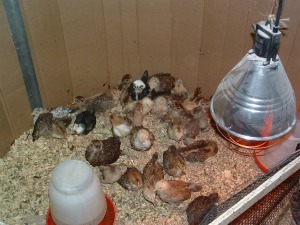A Baby Chick Can Be Cute But Learn All You Can To Help Them Survive
A baby chick is so cute! They make those sweet little sounds, are soft, fluffy, innocent and vulnerable just like most baby animals.
Each spring farm supply stores have their heat lamps going and a great variety of cheap and sometimes free chicks. If you have never owned a chicken before it’s really important to think things through before leaving the store with one or more.
A baby chick might also turn out to be a rooster that may be illegal where you live or just be a very loud pet that will never let you sleep in.
Possibly you live some place where you could easily sneak in a few chicks but due to the landlord, parents or local laws, once they need to get outside and spread their wings there’s a problem. So be kind to your self and to the chicks and really think this through.
Here at Raising-Chickens.org we strive to keep chickens and their people happy with each other. Being prepared and educated before beginning a new adventure with an animal is so important for all concerned.
We sincerely hope you will take full advantage of all the information here. Our site is designed to help you learn about everything chicken!
A day old chick needs a brooder that provides 95-100 degrees F for the first week of life. The temperature may be reduced by 5 – 10 degrees each week, if they can tolerate it and continue to thrive.
They, of course, need Chick Start and plenty of water plus the company of other chicks. In some states the minimum that can be sold is 6.
When chicks are too cold they will usually peep loudly but at the same time their digestion, major organs, and immune systems are beginning to shut down. They cease to grow and will begin dying if the temperature is not quickly raised.
Chicks that are too hot will generally pant and look lethargic. To revive an over heated baby chick offer single drops of cool water or Chick Save.
Placing its feet in cool, not cold, water may help lower its body temperature if it’s not too late. Chicks will regulate their own body temperature if they are able to move to and from the heat source as they want.

Always use the correct sized heat lamp or bulb and keep a thermometer in the brooder to make sure temperatures aren’t too high or low.
Before bringing home a baby chick make sure you can afford the feeding and care they require and can provide a safe, clean, and roomy environment. Some people do keep a single chicken as a house pet but they do need to get outside for fresh air, sunshine and picking through the grass.
When chicks move outside to live, I like to continue to provide a heat lamp until I finally see they no longer want to use it. Their pen must keep them safe from rodents and

predators as well as family or neighboring pets.
If you have adult chickens or other poultry don’t assume they will welcome newcomers with open wings. When making introductions make sure you have time to observe and protect young chickens if necessary.
Gently handling a baby chick is a great idea. The more they get used to being handled when small the easier they will be to handle as adults. Feeding them treats from your hands will help build a trusting relationship and lasting bond.
Lethargic Chicks
Anytime you have more than one chick, you'll have a weakest and a strongest. In nature, the strong survive and the weak do not.
Every living creature has multiple systems that help it survive. Just like an automobile, if any one part isn't working properly, you may not be able to get where you want to go.
The internal workings of a baby chick are actually quite complex; one system relying on the other, to achieve perfect working order.
Lethargy can be caused by one or more system problems. Generally lethargy is a near final symptom of a less obvious problem. If a chick can be saved at this stage of decline it should be provided with fluids, electrolyte minerals, vitamins, supplemental heat, and basic nutrition.
Hand feeding and special care may be all it needs to catch up to the group and thrive.
Without knowing what has gone wrong to cause lethargy, taking basic steps to assist a chick, is kind of a shot in the dark, hoping to address the symptom long enough for his immune system and other systems to kick-in and help him survive.
To know precisely why would require state-of-the-art medical diagnostics. His survival chance at hatching is 50/50.
With perfect health, as the days and weeks go by, his chances increase. To exhibit life threatening weakness so early in life, I believe, is a low-tech window into this chick's potential.
But those of us who raise and love animals all seem to have a strong desire to save all life and give each a chance to enjoy some part of this world. If we have even the slightest chance that an animal can be saved we should try as long as the animal is not suffering.

Custom Search




New! Comments
Have your say about what you just read! Leave me a comment in the box below.